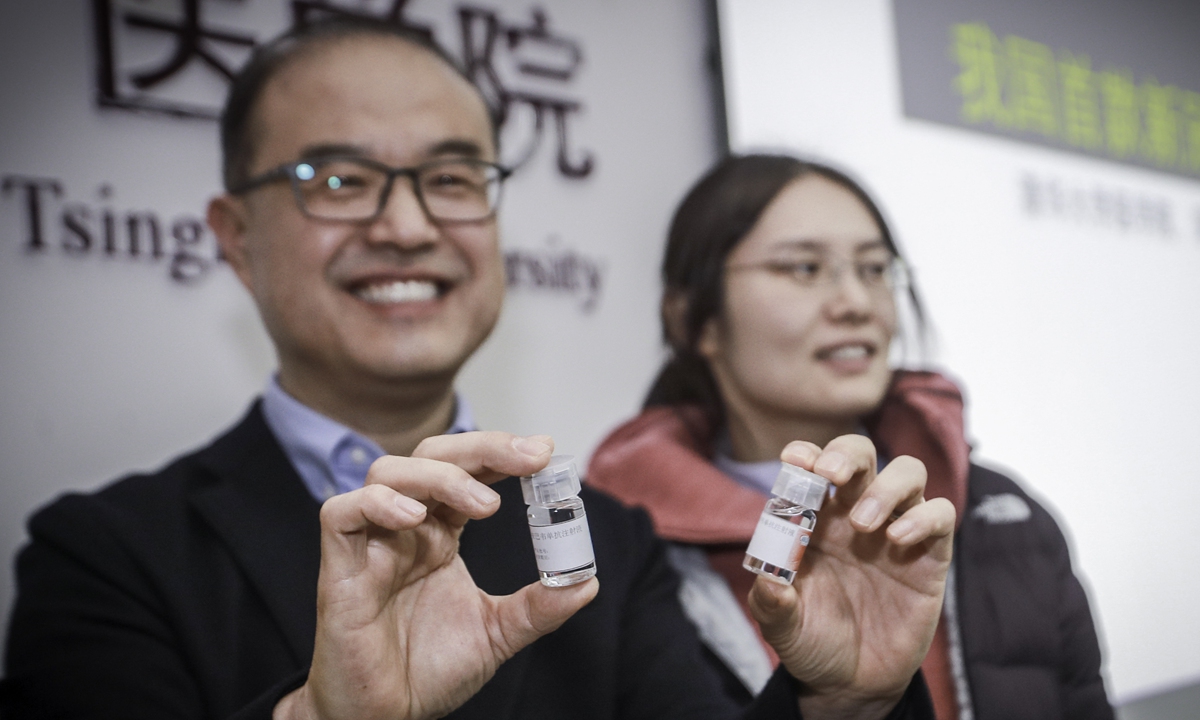
Zhang Linqi (left) of the Tsinghua University School of Medicine shows the newly approved anti-COVID-19 drug at a press conference in Beijing on December 9, 2021. Photo: cnsphoto
The first batch of commercial products of the China-developed neutralizing antibody combination therapy against COVID-19 has been approved for the market in China on Thursday, the company said on Thursday.
The announcement came amid the country reported the first cases caused by the fast transmitting BA.5.2 variant.
The therapy, named BRII-196/BRII-198, jointly developed by Tsinghua University, the Third People's Hospital of Shenzhen and Brii Biosciences, is the first novel coronavirus neutralizing antibody combination therapy drug with independent intellectual property rights approved in China.
The product was approved for market entry in December 2021, for the treatment of adults and adolescents between 12 and 17 years old weighing over 40 kilograms, including individuals with mild and high risk factors for progression to severe conditions, including hospitalization or death.
The therapy was then included in China's 9th national COVID-19 diagnosis and treatment scheme in March 2022. Another treatment included in the scheme was the imported Paxlovid developed by Pfizer.
The company said that in 2021, products providing the therapy were donated for 3,000 people to 22 hospitals in 21 cities across the country when the Delta variant was striking China.
Brii Biosciences had announced previously that its SARS-CoV-2 therapy BRII-196/BRII-198 demonstrated a statistically significant reduction of 78 percent in hospitalizations and deaths in phase III clinical trials conducted in the US, Brazil, South Africa, Mexico, Argentina and the Philippines.
Studies in various independent labs over the world demonstrate that the therapy remains efficacious against the BA.2 variant, the company said.
While some countries have been rescinding their COVID-19 mandates, global experts, including the World Health Organization Director Tedros Adhanom Ghebreyesus, had warned that the COVID-19 pandemic is "most certainly not over."
Some experts had predicted that the sixth infection peak during March and May in Europe would be the last peak of the pandemic, following which the pandemic would decline into regional epidemics. However, the rapidly spreading BA.4 and BA.5 variants have brought more uncertainty.
According to updated data from the US Centers for Disease Control and Prevention, BA.4 and BA.5 were responsible for 70 percent of new COVID-19 cases last week. That is up from 55 percent of cases the week before, when the pair became the dominant strains circulating in the US, media reported on Tuesday.
BA.4 and BA.5 are also spreading across the world.
Cases caused by Omicron's sub-variant BA.5.2 have been discovered in Beijing and Northwest China's Shaanxi Province, leading to strengthened anti-epidemic measures in those areas since Wednesday. As the current dominant variant in the US and Europe, the sub-variant has triggered public concern.
Some experts said that one of the keys to ending the pandemic is to develop new-generation vaccines that can prevent infection instead of severe disease and deaths.
But this may not be easy, as global scientists have been making efforts for this in the past 70 years since the coronavirus was discovered, a Beijing-based immunologist told the Global Times.
Chang Rongshan, a virologist from the Shantou University, said at a forum in May that, for the world, it probably would take five years for the pandemic to descend into regional epidemics.
As for China, the country has always controlled domestic epidemic at a regional level, so it needs to maintain the current situation and prevent a nationwide epidemic, Chang said.
Chinese authorities have stressed to upholding the dynamic zero-COVID policy to protect people's lives.
Chinese research fellows are also rolling out a number of medications and vaccines specified for COVID-19 prevention and treatment.
Vaccine developer CanSinoBIO announced that its COVID-19 mRNA vaccine has received approval for clinical trials in China. China National Pharmaceutical Group also said its second-generation recombinant protein COVID-19 vaccine had received approval for clinical trials.
Sinovac on July 4 kicked off a clinical trial in Hong Kong Special Administrative Region to assess the safety and immunogenicity of its Omicron-specific COVID-19 inactivated vaccine, which is intended to be used as a booster shot for healthy adults.
The Global Times learned from Chinese drug developer Jiangsu Simcere Pharmaceutical Group that clinical trials on its oral COVID-19 medicine have progressed smoothly and entered the second phase. The medicine also can be used for COVID-19 prevention and the company is considering conducting overseas clinical trials on prevention efficacy.




